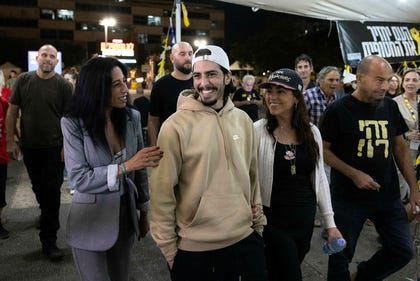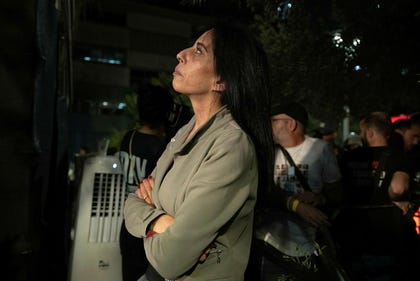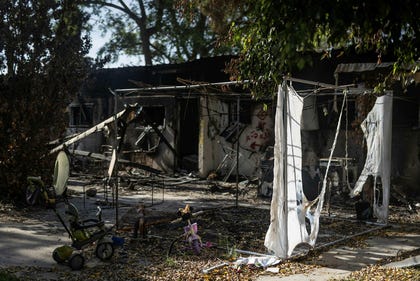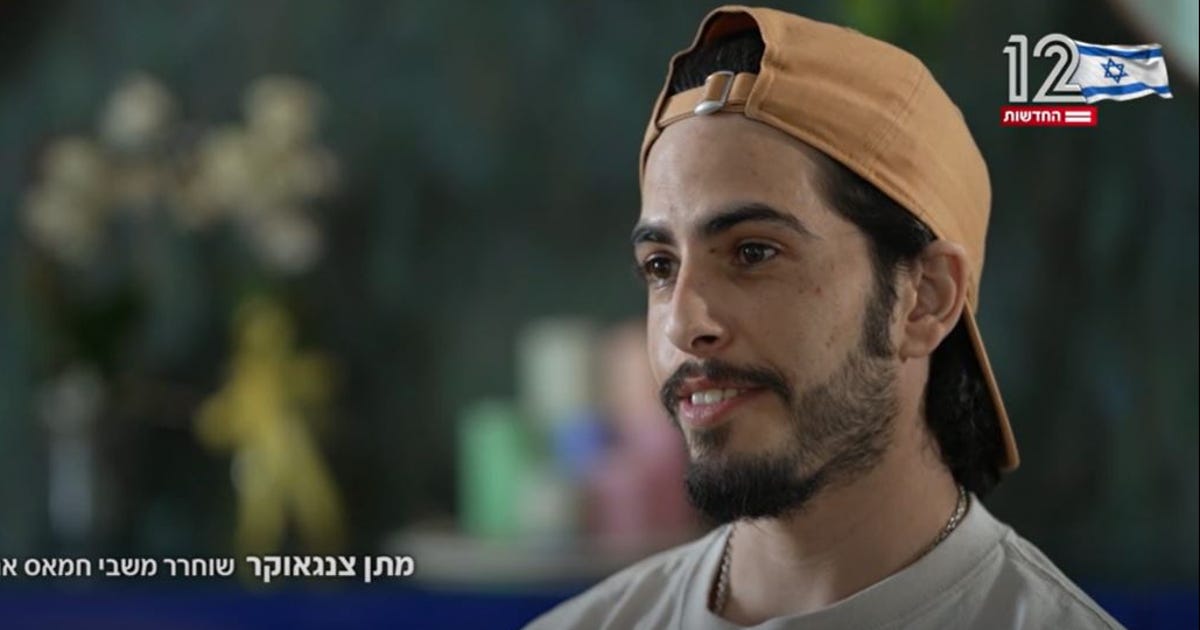Freed hostage Matan Zangauker, who was held in Gaza for over two years before he was released last month as part of the U.S.-brokered cease-fire deal, shared new details from his time in captivity in a Monday interview with Israel’s Channel 12.
Zangauker testified to Channel 12 that his captors treated him as a soldier. “From their perspective, anyone between a certain age is a soldier,” he said. “It showed in interrogations, mental games, and food. It escalated to violence: they would tie my hands behind my back.”
He said that he and other hostages were given only half a pita per day, supposedly because there wasn’t much food. “After half an hour or an hour, they would prepare food for themselves. Smells of eggplant, tomatoes, [they were] really pampering themselves. In the beginning, they also had meat.”
Related Articles
He initially didn’t know that his partner, Ilana Gritzewsky, had also been taken to Gaza, learning about her abduction only when his captors showed him on television that she had been released.
Zangauker shared his memories from the day he learned that his mother, Einav, was one of the leading activists of the protest movement calling to free the hostages. “The sheikh of the tunnel, their commander, came,” Matan told Channel 12. “‘He asked me, ‘You’re Zangauker, right?’ I said, ‘Yes, why?’ He said, ‘Your mother is holding protests, she shook up the whole country.'”
“It made me very happy,” he said. “It strengthened me personally. I thought, ‘My mom’s okay, if she’s out of the house and taking action, it’s better than sitting at home in despair.’ I was very glad to hear that – it helped me a lot.”

 Close
Close
Matan Zangauker at Tel Aviv’s Hostage Square, alongside his mother Einav, this month. Credit: Moti Milrod
Matan Zangauker at Tel Aviv’s Hostage Square, alongside his mother Einav, this month. Credit: Moti Milrod
Zangauker said Einav’s activism did not surprise him. “My mom has always been a lioness,” he said. “She’s always taken the world by storm and succeeded. She got everything we needed, everything we wanted. She was always independent, always caring for us – truly a lioness.”
As the militants became aware of his mother’s efforts, he noted, their treatment of him improved. “They looked at me differently. I felt it in the small talk they would have with me, the extra food they offered. They became genuinely kinder the moment my mother entered the picture.”
“My mother saved me,” Matan stressed. “It’s thanks to her that I’m here. At the end of the day, I know I’m here thanks to my mom, the people of Israel, and our heroic soldiers.”

 Close
Close
Einav Zangauker, days before her son was released, in Tel Aviv, October. Credit: Naama Grynbaum
Einav Zangauker, days before her son was released, in Tel Aviv, October. Credit: Naama Grynbaum
Zangauker also told Channel 12 that he was partly held above ground, as Israeli soldiers operated nearby. When asked whether he had considered trying to signal the soldiers, he replied that he had thought about leaving messages in the sand or signaling them in other ways, but he was too afraid of being caught.
Haaretz Weekly‘I couldn’t vote for Trump, but I’m glad he won’: Top Jewish podcaster Jonah Platt on Israel, Gaza and antisemitism in America
play
Haaretz Weekly
‘I couldn’t vote for Trump, but I’m glad he won’: Top Jewish podcaster Jonah Platt on Israel, Gaza and antisemitism in America
Volume: 0.5
1X
total– : –time0:00
fast forward15
play
rewind15
About two weeks later, Hamas militants took him into a tunnel. He also described being moved from tent to tent among Gazan families, disguised as a Palestinian.
He also recounted the day he was taken hostage from the Gaza border community of Kibbutz Nir Oz. On the morning of October 7, 2023, he told his partner, fellow captivity survivor Ilana Gritzewsky, “Honey, it’s just sirens, an hour or two, and it’ll pass.”
Reflecting on the day of the massacre, he said: “I looked right and left and saw the kibbutz functioning. I saw people on motorcycles, people in houses. It seemed like a normal day – then it hit me that these weren’t our people.”

 Close
Close
Kibbutz Nir Oz after October 7. Credit: Hadas Parush
Kibbutz Nir Oz after October 7. Credit: Hadas Parush
Crossing into Gaza, Zangauker recalled, he was met by a crowd of men, women, and children wielding sticks and stones who began to beat him. “Then [the terrorists] took me to the tunnel entrance, and I saw a soldier’s body,” he said. “I sat next to his head while they shouted and threatened me.”
“I just disconnected and fell asleep,” Zangauker added. “There was yelling and talking, but it didn’t bother me – my body was experiencing extreme stress and shut down.”
When asked about the collapse of the second hostage release deal, Zangauker said he had “lost hope.” According to him, “If I had even a spark of hope – maybe I’d get out, maybe I’d be freed – it was lost somewhere along the way.”
“Meanwhile, there were politicians making noise and ringing alarms, as they say,” he said, noting in particular National Security Minister Itamar Ben-Gvir. “They showed it extensively on Arab networks, on Al Jazeera, on Sky News. They were covering it, it was literally a headline for them, and it affected us personally.”

 Close
Close
Minister Itamar Ben-Gvir in Marwan Barghouti’s cell in August.
Minister Itamar Ben-Gvir in Marwan Barghouti’s cell in August.
Zangauker also addressed the conspiracies that circulated after his return. “Alongside all the love and support, which is really far greater than the hate, I read things on Facebook, on Instagram,” he said. “When I met my mother for the first time, I had a backpack that the soldier accompanying me had brought me.”
“I also had a bag of tissues,” he added. “People claim Hamas gave me money to deliver to my mother. They say I had sandwiches in the bag that Hamas had arranged. Absurd things.”
“To hear that I was in Qatar, at parties, in a jacuzzi, getting massages and drinking cocktails, while I was in Hamas captivity, getting beaten and cursed,” the freed hostage shared. “I experienced abuse, psychological games, food games. I went through hell, really hell. And people don’t see it that way. That’s what saddens me.”

